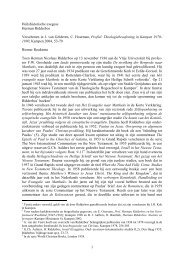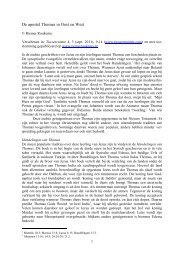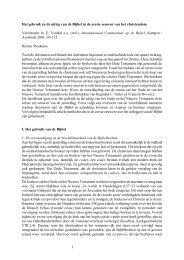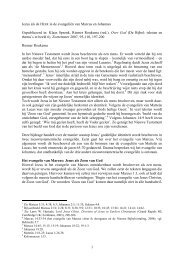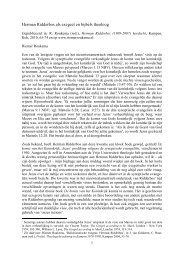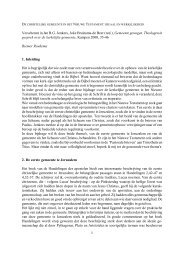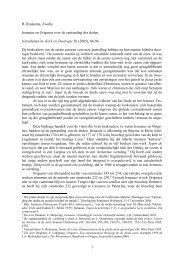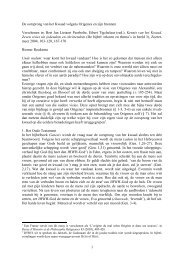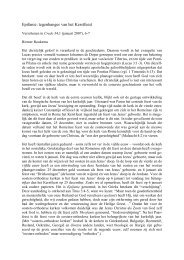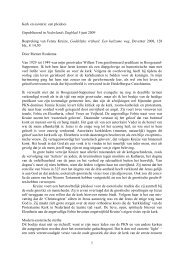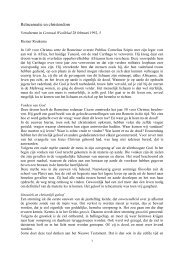Herman Ridderbos‟s Redemptive -historical ... - Riemer Roukema
Herman Ridderbos‟s Redemptive -historical ... - Riemer Roukema
Herman Ridderbos‟s Redemptive -historical ... - Riemer Roukema
Create successful ePaper yourself
Turn your PDF publications into a flip-book with our unique Google optimized e-Paper software.
history would end soon after his resurrection, as if the kingdom would soon come in<br />
all its fullness. The time of the church would come first, sharing in the provisional<br />
\fulfillment of the promise of the kingdom. With this view Ridderbos distinguishes<br />
himself in the first place from those exegetes who regard the coming of the kingdom<br />
as one-sidedly imminent, implying that it has come to earth through Christ‟s<br />
coming. Secondly he distinguishes himself from those, including Schweitzer, who<br />
shift all focus to the eschatological character of Jesus‟ preaching of God‟s kingdom.<br />
After all, this view leaves no room for the fulfillment of God‟s promises at the time<br />
of Christ‟s ministry on earth. Thirdly, Ridderbos distinguishes himself from Bultmann<br />
in as far as the latter places all emphasis on the choice for Christ that man<br />
needs to make irrespective of any concrete development of history.<br />
Ridderbos not only contrasts his view on redemptive-<strong>historical</strong> exegesis with<br />
those of liberal exegetes. In as far as the traditional Reformed interpretation of<br />
Scripture emphasizes the “order of salvation”, i.e., is focussed on the spiritual<br />
development and experiences of the believer, Ridderbos – and this is our fourth<br />
point – opposes this by saying that Scripture is not concerned with this. According<br />
to Ridderbos, the Bible places all emphasis on what has been done for man “objecttively”<br />
and “forensically” in Christ. This means that whoever believes in Christ and<br />
has been baptized, should not focus on his or her own pious inner self, but on Christ<br />
in whom God gives his promises.<br />
Fifthly, Ridderbos contrasts his view on redemptive-<strong>historical</strong> exegesis with<br />
the naive fundamentalist interpretation of the Scriptures, which believes that even all<br />
those matters that are not directly linked to the redemptive facts need to be interpreted<br />
as <strong>historical</strong> facts. This view is apparent in his argument that Christ intended<br />
the creation of the New Testament canon, so that this too is founded in redemptive<br />
history.<br />
The influence of Ridderbos<br />
Finally, we will now briefly look at the question to what extent Ridderbos‟s work is<br />
still influential today.<br />
All over the world his books are being used by Orthodox Reformed and<br />
Evangelical theologians. They appreciate the way he maintains the historicity of the<br />
redemptive facts and does not consider any New Testament epistles as pseudepigraphic.<br />
But even outside those circles he is still well-respected. For instance,<br />
Dunn‟s The Theology of Paul the Apostle dating from 1997 contains numerous<br />
references to Ridderbos‟s book on Paul. 55<br />
In his native country it is mainly his commentaries on the Pauline Epistles,<br />
his book on Paul and his commentary on the Gospel of John that are being used, but<br />
this does not mean that his specific view of salvation-<strong>historical</strong> exegesis as opposed<br />
to exegesis on the basis of the “order of salvation” is still widely accepted today. On<br />
the contrary, there is a general call for the experience of faith and spirituality. The<br />
view that whoever is baptized has been objectively and corporately incorporated in<br />
Christ and has no need to consider his subjective experience of faith is shared by<br />
only a few now that Barthian teaching has also lost much of its influence. However,<br />
with regard to Ridderbos‟s influence one needs to remember that two of his most<br />
55 See n. 50.<br />
13



